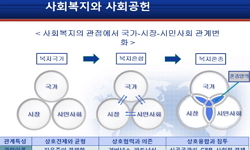For more than two decades, social enterprise movements in the United States and in Europe have taken on growing importance. Broadly defined as the use of non-governmental, market-based approaches to addressing social issues, social enterprise has beco...
http://chineseinput.net/에서 pinyin(병음)방식으로 중국어를 변환할 수 있습니다.
변환된 중국어를 복사하여 사용하시면 됩니다.
- 中文 을 입력하시려면 zhongwen을 입력하시고 space를누르시면됩니다.
- 北京 을 입력하시려면 beijing을 입력하시고 space를 누르시면 됩니다.
‘사회적기업육성법’제정 및 시행 후의 발전방향 = The Enactment of the Social Enterprise Promotion Act and Its Development
한글로보기https://www.riss.kr/link?id=A76188992
- 저자
- 발행기관
- 학술지명
- 권호사항
-
발행연도
2008
-
작성언어
Korean
-
주제어
사회적기업 ; 비영리 기업 ; 지역사회 벤처 ; 사회적 목적기업 ; 사회적법인 ; 자선 ; 사회적 가치 ; 법적형태 ; 사회적기업육성위원회 ; 사회적기업육성기본계획 ; 연계기업 ; 비영리조직 ; 공익법인 ; 비영리민간단체 ; 사회복지법인 ; 생활협동조합 ; 취약계층 ; 사회서비스 ; 인증절차 ; 조세지원 ; social enterprise ; nonprofit enterprise ; community wealth venture ; social purpose enterprise ; social firm ; philanthropy ; social value ; NGO ; REDF ; double bottom line
-
자료형태
학술저널
- 발행기관 URL
-
수록면
33-72(40쪽)
-
KCI 피인용횟수
18
- DOI식별코드
- 제공처
-
0
상세조회 -
0
다운로드
부가정보
다국어 초록 (Multilingual Abstract)
Yet while the trend and its ultimate objectives are similar, there remain vast differences in the conceptualization of social enterprise among different world regions. These differences stem from contrasting forces shaping and reinforcing the movement in each region.
According to J. A. Kerlin, the concept of social enterprise in the United States is generally much broader and more focused on enterprise for the sake of revenue generation than definitions elsewhere. This remains true even when considering the definitional divide in the United States between academics and practitioners.
In Western Europe, the trend toward social enterprise emerged somewhat later than in the United States and was focused on the simultaneous development of public interest services, and diversification of revenue generation in the third sector.
Most social enterprises in Western Europe operate under the legal form of either a nonprofit association or a cooperative. Social enterprises are established as associations in those countries where the legal definition of association allows a degree of freedom in selling goods and services on the open market. In countries such as Sweden, Finland and Spain, where associations are more limited in this regard, social enterprises tend to take the legal form for cooperatives.
In Korea, the Social Enterprise Promotion Act was enacted on December 8, 2006 and became effective on July 1, 2007. The social enterprise is defined as those enterprises which trade in goods or services for a social purpose through the employment of people from a disadvantaged community, and was recognized by the Minister of Labor.
The legal form of the social enterprise is not limited to the non-profit organization. It ranges between association in the Civil Code and companies in the Commercial Code. The corporation of public interest, non-profit private organization, social welfare corporation, consumers' cooperation can be also social enterprise.
The Minister of Labor can support the social enterprises with professional consultation for management, technique, tax, labor, accounting and other necessary information. The State or local autonomous governments can support the social enterprises by renting the state-owned or public land, and by reducing or exempting taxes.
The criticism was raised to the recognition and promotion of the social enterprise by the government, because the social enterprises in the United States and Western Europe have appeared on the initiative of private organizations. It would be contradictory, if the government supports those activities in the field, where the government was not engaged.
The requirement of social enterprise to employ people from a disadvantaged community is also difficult to be met, as those unskilled elderly people, women, disabled, most of whom were once excluded from the labor market, can hardly compete with the regular workers of the same business.
Those problems have to be keenly observed in the implementation of the Social Enterprise Promotion Act and it will help the interest parties find the way to develop the young social enterprises in Korea.
For more than two decades, social enterprise movements in the United States and in Europe have taken on growing importance. Broadly defined as the use of non-governmental, market-based approaches to addressing social issues, social enterprise has become an increasingly popular means of funding and supplying social initiatives around the world.
Yet while the trend and its ultimate objectives are similar, there remain vast differences in the conceptualization of social enterprise among different world regions. These differences stem from contrasting forces shaping and reinforcing the movement in each region.
According to J. A. Kerlin, the concept of social enterprise in the United States is generally much broader and more focused on enterprise for the sake of revenue generation than definitions elsewhere. This remains true even when considering the definitional divide in the United States between academics and practitioners.
In Western Europe, the trend toward social enterprise emerged somewhat later than in the United States and was focused on the simultaneous development of public interest services, and diversification of revenue generation in the third sector.
Most social enterprises in Western Europe operate under the legal form of either a nonprofit association or a cooperative. Social enterprises are established as associations in those countries where the legal definition of association allows a degree of freedom in selling goods and services on the open market. In countries such as Sweden, Finland and Spain, where associations are more limited in this regard, social enterprises tend to take the legal form for cooperatives.
In Korea, the Social Enterprise Promotion Act was enacted on December 8, 2006 and became effective on July 1, 2007. The social enterprise is defined as those enterprises which trade in goods or services for a social purpose through the employment of people from a disadvantaged community, and was recognized by the Minister of Labor.
The legal form of the social enterprise is not limited to the non-profit organization. It ranges between association in the Civil Code and companies in the Commercial Code. The corporation of public interest, non-profit private organization, social welfare corporation, consumers' cooperation can be also social enterprise.
The Minister of Labor can support the social enterprises with professional consultation for management, technique, tax, labor, accounting and other necessary information. The State or local autonomous governments can support the social enterprises by renting the state-owned or public land, and by reducing or exempting taxes.
The criticism was raised to the recognition and promotion of the social enterprise by the government, because the social enterprises in the United States and Western Europe have appeared on the initiative of private organizations. It would be contradictory, if the government supports those activities in the field, where the government was not engaged.
The requirement of social enterprise to employ people from a disadvantaged community is also difficult to be met, as those unskilled elderly people, women, disabled, most of whom were once excluded from the labor market, can hardly compete with the regular workers of the same business.
Those problems have to be keenly observed in the implementation of the Social Enterprise Promotion Act and it will help the interest parties find the way to develop the young social enterprises in Korea.
목차 (Table of Contents)
- Ⅰ. 미국과 유럽에서의 사회적기업 태동
- Ⅱ. 사회적기업육성법의 제정
- Ⅲ. 사회적기업육성법의 핵심사항
- Ⅳ. 발전방향
- 【ABSTRACT】
- Ⅰ. 미국과 유럽에서의 사회적기업 태동
- Ⅱ. 사회적기업육성법의 제정
- Ⅲ. 사회적기업육성법의 핵심사항
- Ⅳ. 발전방향
- 【ABSTRACT】
참고문헌 (Reference)
1 이광택, "사회적기업의 창업과 육성, In 사회적기업, 새로운 세계" 실업국민국민재단 함께 일하는 사회 2007
2 Jones, D, "사회적 기업: 용어의 모호성과 복합성 문제에 대한 고찰" Social Enterprise London 2 (2): 21-, 2006
3 Jones, D, "사회적 기업: 용어의 모호성과 복합성 문제에 대한 고찰" 22-,
4 정선희, "사회적 기업" 다우출판사 10-, 2004
5 "http://www.acevo.org.uk/legalforms"
6 Evans, M. D, "The Contribution of Social Capital in the Social Economy to Local Economic Development in Western Europe: Key Concepts, Measures and Indicators" Concise Project, Middlesex University 2000
7 Kerlin, J. A, "Social Enterprise in the United States and Abroad: Learning From Our Differences" The Aspen Institute 1 (1): 105-, 2006
8 Pearce, J, "Social Enterprise in Anytown" Caluste Gulbenkian Foundation 2003
9 Birmingham Social Economy Consortium, "Social Enterprise in Anytown" Caluste Gulbenkian Foundation 2003
10 Flannery, D., "Leading the Social Purpose Enterprise: An Examination of Organizational Culture" REDF, Social Purpose Enterprises and Venture Philantropy in the New Millennium
1 이광택, "사회적기업의 창업과 육성, In 사회적기업, 새로운 세계" 실업국민국민재단 함께 일하는 사회 2007
2 Jones, D, "사회적 기업: 용어의 모호성과 복합성 문제에 대한 고찰" Social Enterprise London 2 (2): 21-, 2006
3 Jones, D, "사회적 기업: 용어의 모호성과 복합성 문제에 대한 고찰" 22-,
4 정선희, "사회적 기업" 다우출판사 10-, 2004
5 "http://www.acevo.org.uk/legalforms"
6 Evans, M. D, "The Contribution of Social Capital in the Social Economy to Local Economic Development in Western Europe: Key Concepts, Measures and Indicators" Concise Project, Middlesex University 2000
7 Kerlin, J. A, "Social Enterprise in the United States and Abroad: Learning From Our Differences" The Aspen Institute 1 (1): 105-, 2006
8 Pearce, J, "Social Enterprise in Anytown" Caluste Gulbenkian Foundation 2003
9 Birmingham Social Economy Consortium, "Social Enterprise in Anytown" Caluste Gulbenkian Foundation 2003
10 Flannery, D., "Leading the Social Purpose Enterprise: An Examination of Organizational Culture" REDF, Social Purpose Enterprises and Venture Philantropy in the New Millennium
11 "Comparative table of existing legislation in Europe" 2006
12 Strom,, S, "A FRESH APPROACH; What's Wrong With Profit?"
동일학술지(권/호) 다른 논문
-
- 국민대학교 법학연구소
- 강구철(Kang Koo Chul)
- 2008
-
여성가족ㆍ청소년 부문의 규제개혁 문제에 관한 법정책학적 연구
- 국민대학교 법학연구소
- 황승흠(Hwang Seung Heum)
- 2008
-
- 국민대학교 법학연구소
- 안경희(Ahn Kyung Hee)
- 2008
-
- 국민대학교 법학연구소
- 채승우(Chae Sung Woo)
- 2008
분석정보
인용정보 인용지수 설명보기
학술지 이력
| 연월일 | 이력구분 | 이력상세 | 등재구분 |
|---|---|---|---|
| 2027 | 평가예정 | 재인증평가 신청대상 (재인증) | |
| 2021-01-01 | 평가 | 등재학술지 유지 (재인증) |  |
| 2018-01-01 | 평가 | 등재학술지 유지 (등재유지) |  |
| 2015-05-06 | 학술지명변경 | 외국어명 : 미등록 -> KOOKMIN LAW REVIEW |  |
| 2015-01-01 | 평가 | 등재학술지 선정 (계속평가) |  |
| 2013-01-01 | 평가 | 등재후보학술지 유지 (기타) |  |
| 2012-01-01 | 평가 | 등재후보학술지 유지 (기타) |  |
| 2011-01-01 | 평가 | 등재후보학술지 유지 (등재후보1차) |  |
| 2009-01-01 | 평가 | 등재후보학술지 선정 (신규평가) |  |
학술지 인용정보
| 기준연도 | WOS-KCI 통합IF(2년) | KCIF(2년) | KCIF(3년) |
|---|---|---|---|
| 2016 | 0.6 | 0.6 | 0.77 |
| KCIF(4년) | KCIF(5년) | 중심성지수(3년) | 즉시성지수 |
| 0.7 | 0.75 | 0.97 | 0.22 |




 KCI
KCI DBpia
DBpia






